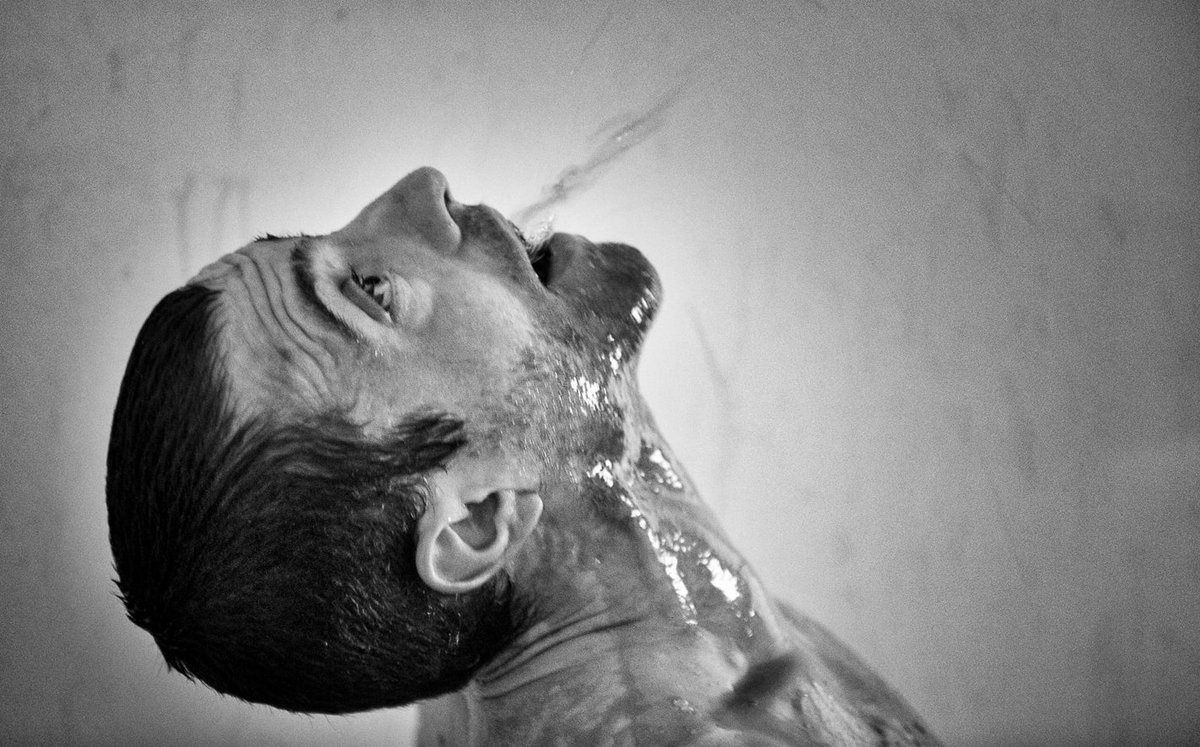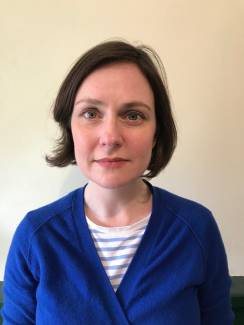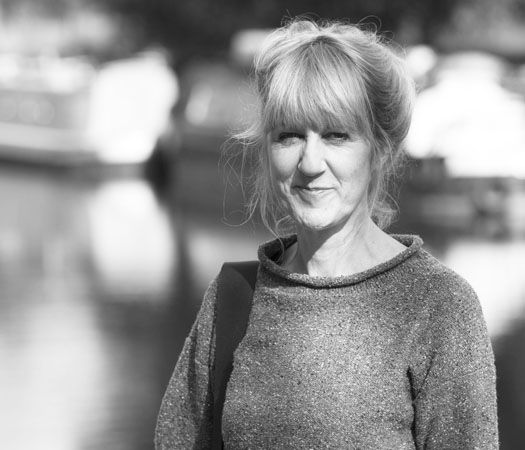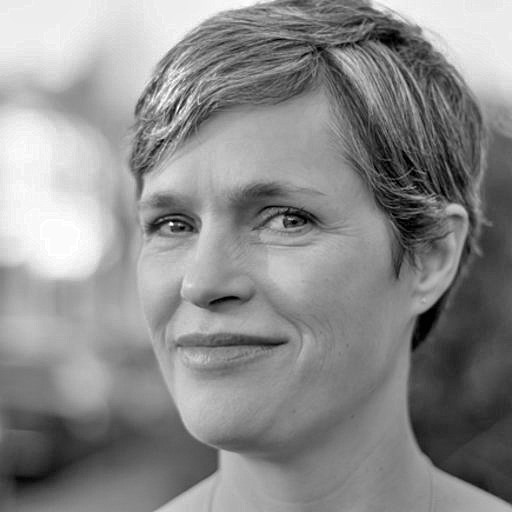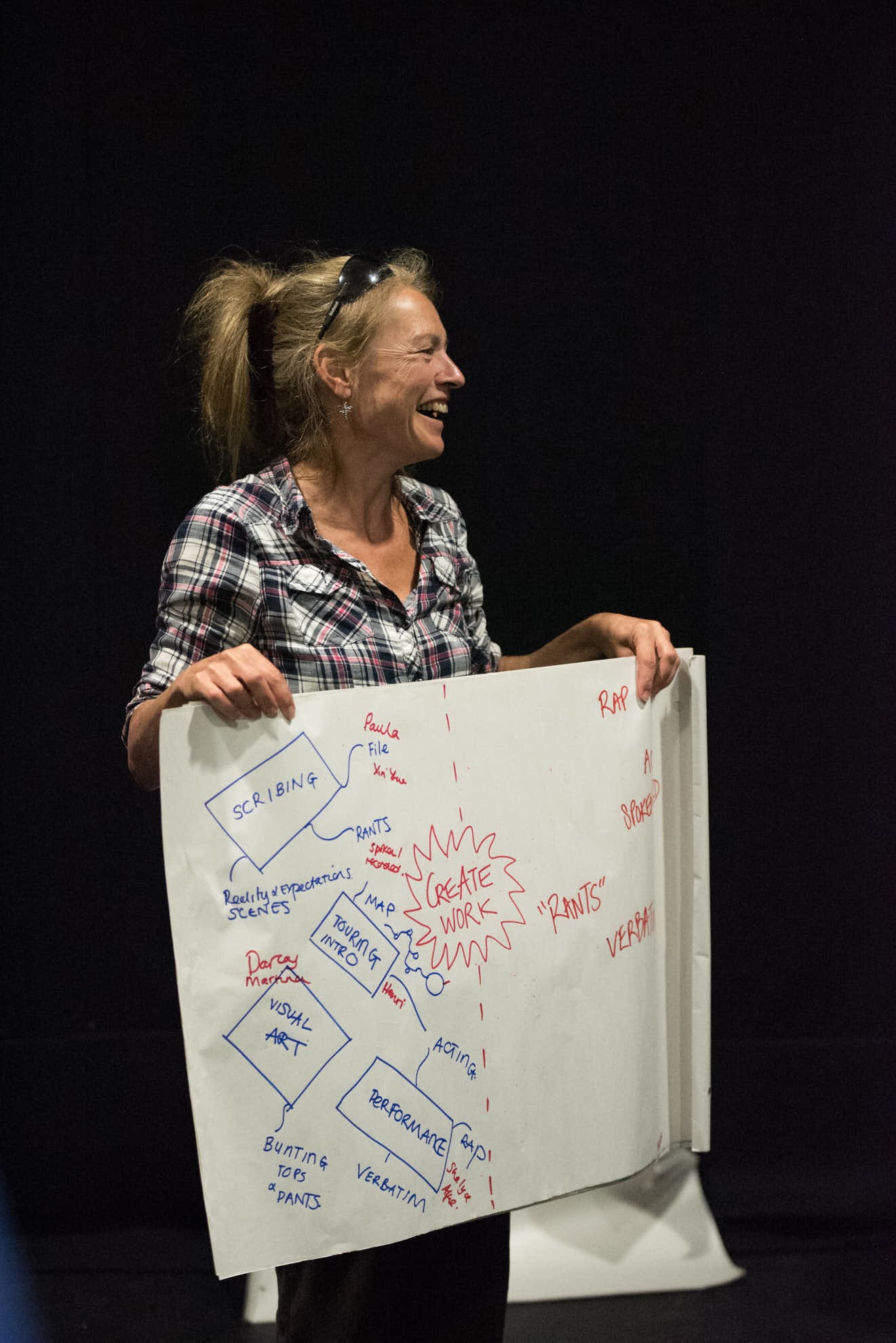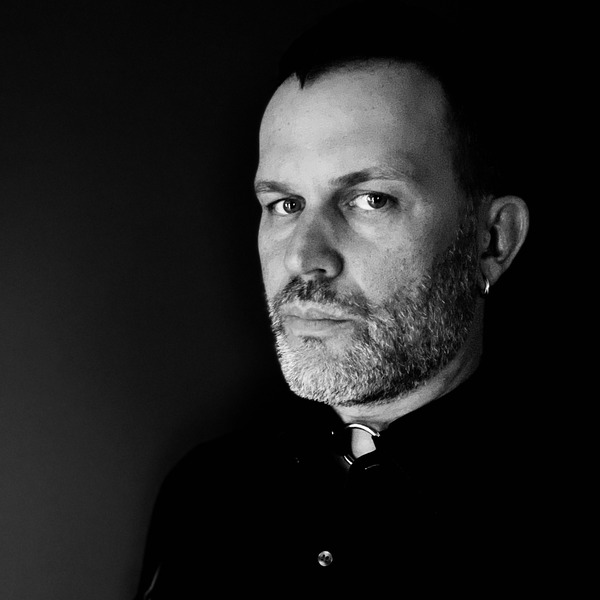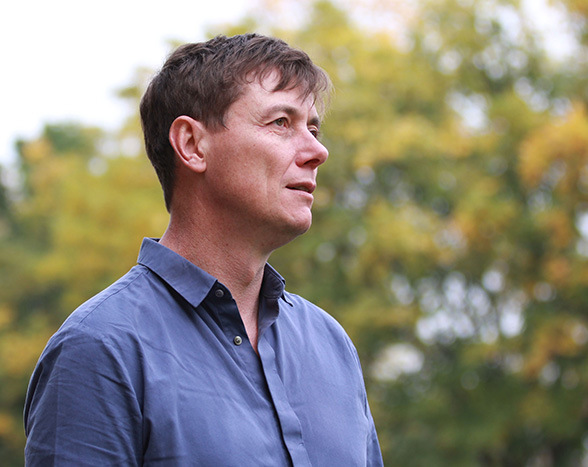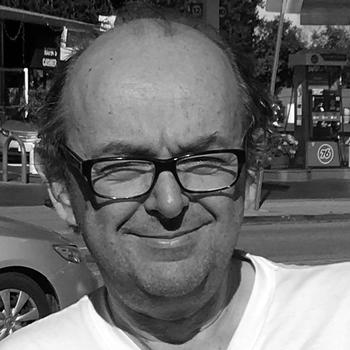Study options
- Starting in
- September 2025
- Location
- Mile End
- Fees
- Home: £12,250
Overseas: £25,500
EU/EEA/Swiss students
What you'll study
Our MA Theatre and Performance encourages you to explore your own ideas in depth and build a body of original, thought-provoking work. A key benefit of the programme is its flexibility: across compulsory and optional modules, you can develop your interests in both theoretical and practical projects to advance your expertise and career.
We balance rigorous theoretical and historical exploration with experimental performance practice. You will work with our internationally respected academic staff and attend workshops and mentoring sessions with in-house and visiting artists throughout your studies, building your professional network in the process. In recent years our MA has hosted a wide range of high-profile artists, including Stacy Makishi, Peggy Shaw and Manuel Vason among others.
You will see the latest in contemporary theatre, from live art to productions at international institutions like the Royal Court.
To develop your experience in the cultural industries, we offer a brief placement with one of our partner organisations or artists.
Structure
- Four assessed modules
- A 12,000-15,000-word dissertation or practice-based dissertation
Compulsory/Core modules
"This independent research project culminates in a dissertation of 12,000-15,000 words. Working with the support of a supervisor, students pursue their own independent investigation of the theory and practice of performance. Research development is also encouraged by a dissertation colloquium in late May/early June, in which students present their research in progress and receive feedback from academic staff and other graduate students. Recent dissertation topics have included studies of illness and performance, performance and second language acquisition, the performance of rural spaces and identities, contemporary performance and relational aesthetics, circus performance in Victorian Britain, cultural value and performance and performance and social conflict."
This module explores urgent socio-political and aesthetic issues in contemporary theatre and performance through a focus on material and cultural conditions of production and reception. Drawing on London¿s rich performance resources but also looking globally, it examines what is urgent in contemporary theatre and performance and how theatre and performance scholarship can help us understand contemporary cultures and cultural debates. In weekly seminars informed by critical reading and preparation, you will explore a range of issues related to, for example, decolonisation, ethics, bodies, gender, sexuality, finance, spaces, institutions, labour, feelings, and spectatorship. You will consider issues of social power, representation, and social change. The module will respond to emerging issues and scholarship as it happens.
This module explores approaches to making performance which centre the politics of the body. Through weekly workshops, you will be introduced to a range of performance-making techniques, and will be encouraged to devise your own methodologies for creating performance. The module will draw on methodologies from live art and experimental performance, using improvisation, action and task-based performance, autobiographical approaches, and score making to develop creative and critical strategies for exploring bodies, identity, and politics. The module will ask what our bodies in performance are capable of saying and doing, and how we might use them to intervene into discourses on identity and politics.
This module explores how performance contributes to social justice, especially through activism. It examines: activist movements, such as Black Lives Matter, Extinction Rebellion, and activism for indigenous rights; activist practices and actions, spanning pacifism and violence, and including occupations, events like carnivals, and performances such as verbatim theatre; and intersecting theories of activism, social justice, and performance, such as Boal¿s Poetics of the Oppressed, Judith Butler¿s theory of assembly, and Christina Sharpe¿s theory of wake-work, drawing on wider literatures in, for example, critical race theory, environmental humanities, queer theory, law, and disability rights. The module focuses on the present but explores historical roots, such as the Diggers and Levellers of the English Civil War, South African Township Theatre, women's suffrage movements, struggles for abolition and decolonisation, and activism in relation to disability, AIDS, and more. It explores arguments for activism's benefits but also explorations of its limits. It considers how performance studies can help us better understand ¿ and potentially practice ¿ activism for social justice, and how performance might particularly contribute to action for social change.
This module explores through practice the relation between text, self, and performance, in order to investigate critically the way performance may articulate individual experience, to invoke or confirm aspects of collective identity, and to complicate the assumed relations between performances and texts. Through weekly practical workshops and contextual research, you will explore forms, methodologies and topics including (for example): writing for solo performance, live art, verbatim and documentary theatre, improvisation, protest performance, and oral histories. Your practical investigations will be embedded in critical readings in identity politics and social justice, in relation to identity formations including gender, sexuality, race, class and ability. In your engagement with found or created texts, you will consider truth and dissemblance, authenticity and representation, auto/biography and disclosure, particularity and community, the politics of representation, and the ethics of performance. Throughout, an emphasis is placed on testing the limits of familiar approaches to creating and performing texts.
Assessment
- 67% Modules
- 33% Dissertation
You will normally be assessed by a combination of essay, of about 3,500 words, and a presentation for each seminar-based module you take, a combination of a performance project and portfolio documentation for practice-based modules and either the written dissertation of 12,000-15,000 words or the practice-based dissertation with a 5,000 word critical analysis and documentation of practice-based research.
Dissertation
You have the choice of either:
DRA7711 “Practice-Based Dissertation” (60 credits)
This independent research project culminates in a practice-based research dissertation consisting of a 5,000 word reflection and appropriate documentation of practice. Working with the support of a supervisor, students pursue their own independent investigation of the theory and practice of theatre and performance.
OR
DRA7000 “Dissertation” (60 credits)
This independent research project culminates in a written dissertation of 12,000-15,000 words. Working with the support of a supervisor, students pursue their own independent investigation of the theory and practice of theatre and performance.
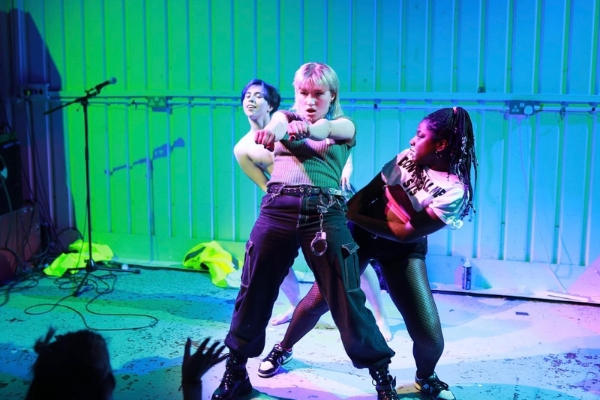
—Through rigorous academic engagement, the MA at Queen Mary has been an incredible opportunity to develop my creative practice. The course interweaves practical and scholarly thinking to help construct and refine your research interests and ultimately find your niche. The staff in the department are like no other, as they consistently provided me with invaluable support, inspiration and encouragement
Pianka Parna, MA Theatre and Performance 2023
Teaching
Students will learn through studio-based and discussion-led methods, through workshops, lectures, master classes, seminars, fieldwork, and professional placements. The taught component of the programme includes a mix of seminars and practical workshops.
Where you'll learn
Facilities
- BLOC - a new Film & Drama Practice research facility at QMUL
- A range of performance spaces, including the Pinter Studio, Rehearsal Rooms 1, 2, and 3 and film studio
- A dedicated postgraduate Film and Drama Studio in ArtsTwo
- Access to Queen Mary's libraries on all our campuses
- Our Graduate Centre: purpose-built study spaces and a roof-top terraced common room
- Access to the superb collections at Senate House Library, University of London, Live Art Development Agency and National Theatre
Campus
We are based in the heart of London’s creative industries and encourage you to take advantage of the opportunities this gives you. As Queen Mary is on the Central Line of the Underground tube network, you are only a few minutes away from some of the world’s greatest cultural institutions, such as the National Theatre and the Barbican as well as underground venues like The Yard Theatre in Hackney Wick.
We have close links with London's leading cultural institutions which means you will have the opportunity to work with theatre and other arts professionals.
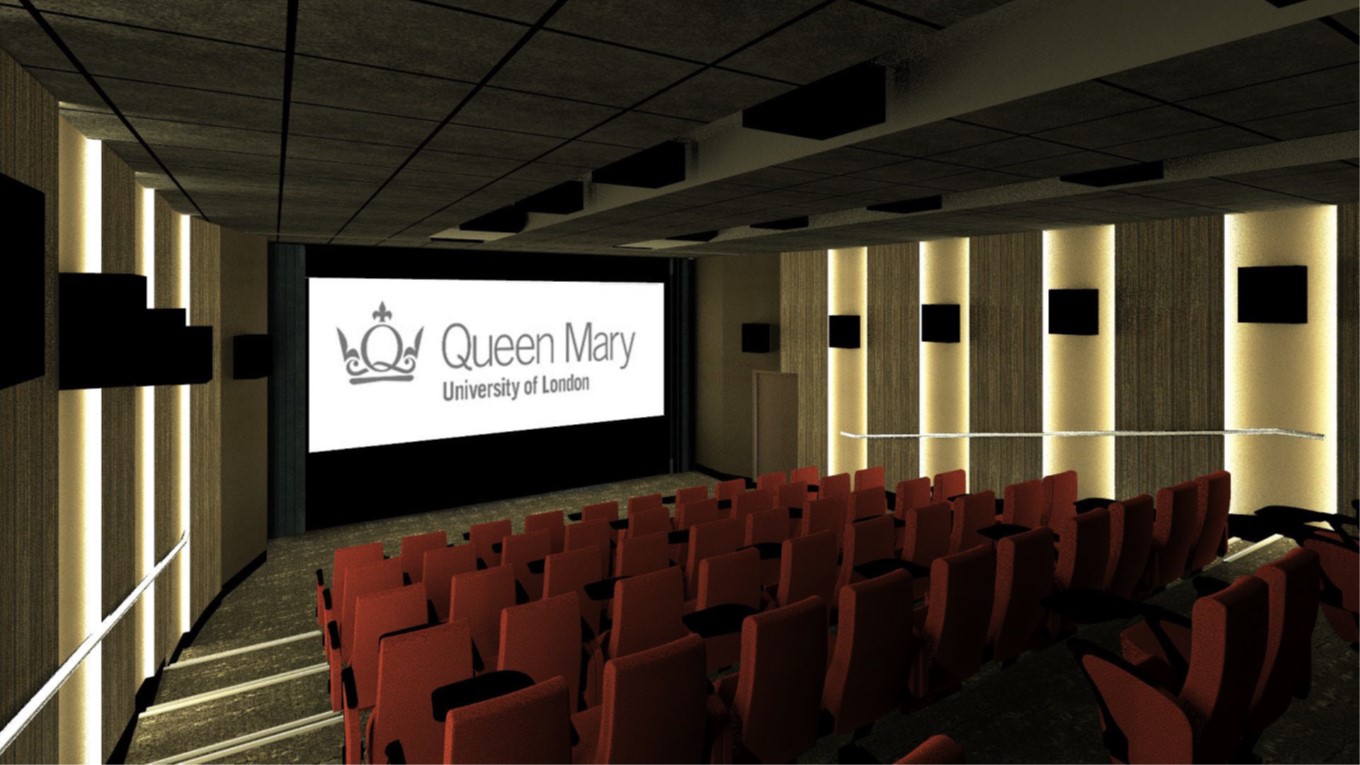
About the School
School of the Arts
The School of the Arts combines innovation, discovery and excellence in education and research in Drama, Film, Modern Languages, English & Comparative Literature, Creative Writing, Linguistics and Liberal Arts. We rank in the top 100 worldwide for Arts and Humanities (QS World University Rankings by Subject 2024)
With our commitment to social justice, inclusivity and social mobility, our collaborations with external organisations, prominent writers and performers, and our facilities that support both academic and practice-based learning, an education in the School of the Arts equips our students with critical thinking and practical skills, unleashes their imagination and enables them to reach the levels of excellence needed in today’s industries.
We regularly host prominent writers and performers and collaborate with leading organisations such as the V&A, the Barbican, the Live Art Development Agency and Shakespeare’s Globe.
We are renowned for the depth and impact of research - which leads our teaching. We rank 1st for drama and in the top 10 for film in the UK for the quality of our research (REF2021). Our multilingual community brings together brilliant minds from across the world to share a wealth of expertise combining research excellence with an unrivalled commitment to social justice and social mobility.
Career paths
We train scholar-artists who can pursue a wide range of careers: we prepare you for research degrees in theatre and performance, help you to develop your own work as an artist or prepare you for a role in the cultural and creative industries, or in a range of other creative professions.
Past students have gone on to roles such as digital marketing officer, freelance director’s assistant and associate lecturer.
Graduates of this course have gone on to work at companies such as:
- Live Art Development Agency
- London Metropolitan University
- The National Student Drama Festival
- Slaughter and May
- The Sugarman Group
- University of the Arts London (UAL)
—I dream of creating educational institutions for performance artists in my country. I also dream of better working conditions for my colleagues and future generations. I hope that all the performances and projects I create or participate in, always speak to the audiences as testimonies of our times.
Fees and funding
Full-time study
September 2025 | 1 year
- Home: £12,250
- Overseas: £25,500
EU/EEA/Swiss students
Unconditional deposit
Home: Not applicable
Overseas: £2000
Information about deposits
Part-time study
September 2025 | 2 years
- Home: £6,150
- Overseas: £12,750
EU/EEA/Swiss students
Unconditional deposit
Home: Not applicable
Overseas: £2000
Information about deposits
Queen Mary alumni can get a £1000, 10% or 20% discount on their fees depending on the programme of study. Find out more about the Alumni Loyalty Award
Funding
There are a number of ways you can fund your postgraduate degree.
- Scholarships and bursaries
- Postgraduate loans (UK students)
- Country-specific scholarships for international students
Our Advice and Counselling service offers specialist support on financial issues, which you can access as soon as you apply for a place at Queen Mary. Before you apply, you can access our funding guides and advice on managing your money:
Entry requirements
UK
Degree requirements
A 2:1 or above at undergraduate level in Drama, Theatre and Performance Studies, English, History of Art, Fine Art or a related subject .
Find out more about how to apply for our postgraduate taught courses.
International
English language requirements
The English language requirements for our programmes are indicated by English bands, and therefore the specific test and score acceptable is based on the band assigned to the academic department within which your chosen course of study is administered. Note that for some academic departments there are programmes with non-standard English language requirements.
The English Language requirements for entry to postgraduate taught and research programmes in the School of the Arts fall within the following English band:
Band 5: IELTS (Academic) minimum score 7.0 overall with 6.0 in each of Writing, Listening, Reading and Speaking
We accept a range of English tests and qualifications categorised in our English bands for you to demonstrate your level of English Language proficiency. See all accepted English tests that we deem equivalent to these IELTS scores.
Visas and immigration
Find out how to apply for a student visa.

